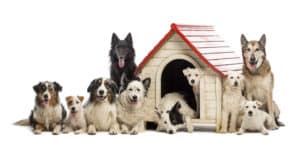As responsible and loving dog owners, we often find ourselves worrying about our pets’ well-being. One common, yet often overlooked health issue in dogs is constipation. Is your dog struggling with irregular bowel movements or showing signs of discomfort while defecating? This guide aims to shed light on the causes of canine constipation and provides advice to manage this common problem.

Signs and Causes of Canine Constipation
Constipation in dogs can occur due to a variety of reasons, some more apparent than others. Knowing these causes can help you better manage your pet’s health.
Diet-Related Issues
Lack of sufficient fibre in the diet, consumption of difficult-to-digest substances like bones, fur or grass or sudden dietary changes can lead to constipation. Keep a watchful eye on what your dog eats to ensure a well-balanced and healthy diet.
Inadequate Exercise
Much like us humans, dogs require regular physical activity to maintain overall health. Exercise stimulates muscle movement in the gastrointestinal tract, which aids digestion and bowel movement. A sedentary lifestyle can lead to sluggish bowels and eventual constipation.
Dehydration
Sufficient hydration is a key element in preventing constipation. Insufficient water intake can result in hard, dry stools that are difficult for your dog to pass. Make sure your pet always has access to fresh water, especially during hot weather or after exercise.
Behavioural Changes
If your dog seems unusually lethargic, less playful or has a decreased appetite, these could be signs of constipation. Changes in your dog’s behaviour are often the first indicator that something’s not quite right.
Physical Signs
Watch out for any physical signs of discomfort when your dog is trying to defecate. This could include straining, whimpering or even reluctance to squat. You may also notice your dog dragging their bottom along the ground.
Age-Related Changes
As dogs age, their metabolism slows down and they become less active, both of which can contribute to constipation. Moreover, senior dogs often have other underlying health issues that could exacerbate the problem. Regular veterinary check-ups become even more important as your dog ages.
Medicinal Side Effects
Certain medications, including antihistamines, painkillers and diuretics, can inadvertently cause constipation in dogs. If your pet is on medication and displaying signs of constipation, it’s essential to discuss this with your vet.
Other Underlying Health Issues
Various health conditions such as kidney disease, hormonal imbalances and prostate disorders can also cause constipation. Such situations highlight the importance of regular veterinary health checks to identify potential problems early.
What to do if your dog is constipated?
If you’ve identified that your dog is suffering from constipation, you might be wondering what to do next. Here are some steps you can take:
Consult a Vet
If the problem persists for more than two days, take your dog to a vet. A veterinary professional can conduct a thorough health check and recommend appropriate treatments.
Adjusting Diet and Routine
Consider incorporating fibre-rich foods into your dog’s diet, such as canned pumpkin or cooked green beans. However, any dietary changes should be introduced gradually to avoid upsetting your pet’s stomach.
Maintaining Hydration and Exercise
Ensure your dog drinks plenty of water throughout the day. Regular exercise can also aid digestion and prevent constipation.
Considering Medicinal Interventions
If the problem persists, your vet may recommend over the counter or prescription laxatives. Always use these under the guidance of a veterinary professional.
Act Now for Your Pet's Health with Blue & White Veterinary Clinic
Don’t let constipation discomfort your beloved pet. Contact us at Blue & White Veterinary Clinic today. Let our experienced team provide the care your pet deserves. Schedule your appointment now. Remember, your pet’s health is our priority.



